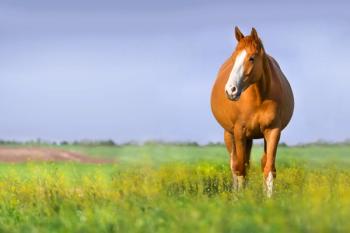
Missing enzymes can lead to foal deaths
A new genetic disease is selectively killing certain Quarter Horse foals by 2 months of age, report researchers at the University of Minnesota (UM).
A new genetic disease is selectively killing certain Quarter Horse foals by 2 months of age, report researchers at the University of Minnesota (UM).
The foals were lacking an enzyme required to form glycogen, the glycogenbranching enzyme (GBE). Without the necessary glucose to metabolize energy,the newborn foals were unable to survive.
UM College of Veterinary Medicine researchers, led by Stephanie Valberg,DVM, Ph.D., analyzed seven related foals that died by 7 weeks of age andextracted tissue samples from their mothers, half and full siblings to studyglycogen formation and two enzymes in its synthesis.
"We think (the foals) have a defect in the gene that is responsiblefor producing the (GBE) enzyme so they don't produce normal protein andtherefore (the gene) doesn't work properly," says Valberg.
Findings indicate that GBE deficiency may be a common cause of neonatalmortality in Quarter Horses, but the deficiency is camouflaged by clinicalsigns that resemble other equine neonatal diseases.
They can present a whole range of different signs, says Valberg.
"Sometimes they're born weak and die very soon after birth. Sometimesthey're born weak and can be nursed into health in the hospital. They seemto get stronger for awhile and then die very suddenly," she explains.
Other foals have spent much more time in the hospital and have progressivelygotten weaker to the point where they can no longer stand up.
Most of the foals Valberg has seen didn't live beyond 10 weeks of age.
At this time, Valberg says researchers don't know how many foals areafflicted annually with the deficiency.
Plans are to develop a genetic test to identify affected foals with ablood test and identify the horses that might carry this disease.
Valberg recommends veterinarians advise owners if they have a foal thathas GBE deficiency to be aware that if they breed the mare again back tothe same stallion, they have a one in four chance of getting this diseaseagain.
The research will be published in the Journal of Veterinary InternalMedicine.
Newsletter
From exam room tips to practice management insights, get trusted veterinary news delivered straight to your inbox—subscribe to dvm360.




